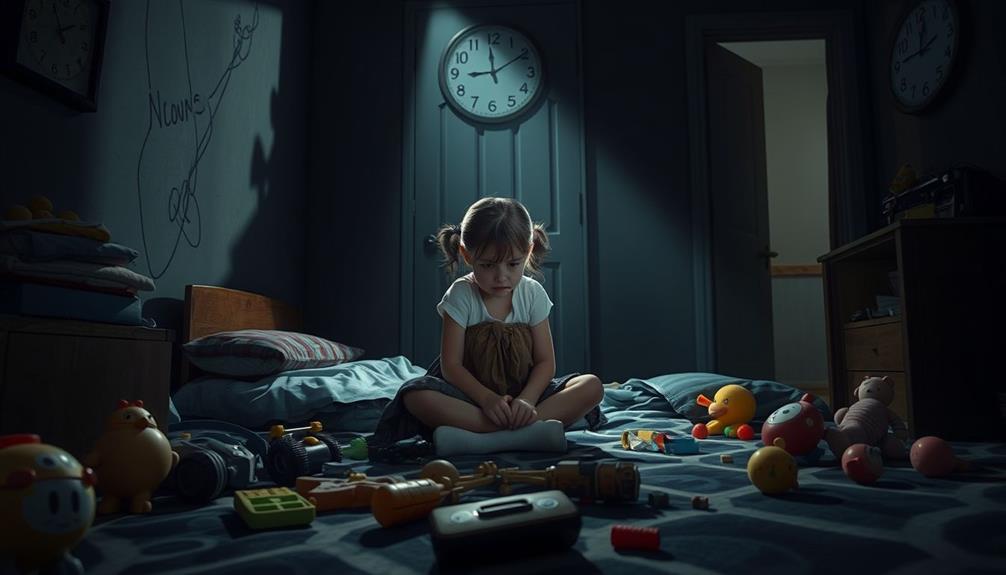If you find yourself constantly walking on eggshells around your father, it could be a sign of his emotional instability. You're likely grappling with a fear of abandonment, leading to trust issues in relationships. You might struggle to set healthy boundaries or feel guilty when prioritizing your own needs. Emotional volatility at home may have created confusion about love and relationships, resulting in intimacy struggles. Overdependence on others' approval could leave you feeling inadequate. If you recognize these patterns, understanding their roots may help you navigate your journey toward healthier connections and better self-awareness.
Key Takeaways
- You experience intense emotional instability, often leading to unpredictable mood swings and anxiety in your relationships.
- You have a deep-seated fear of abandonment, which creates insecurity and difficulty trusting others in your adult relationships.
- You struggle with establishing healthy boundaries, frequently oscillating between idealizing and devaluing your partners.
- You often feel guilty about prioritizing your own needs, leading to emotional dependence on others for validation and approval.
- You experience identity confusion, making it difficult to form genuine emotional connections due to fear of intimacy and misinterpretation of affection.
Constantly Walking on Eggshells

Living with a father who's Borderline Personality Disorder (BPD) often means you're constantly walking on eggshells. You learn quickly that his emotional instability can shift without warning, leaving you in a state of hyper-vigilance. This emotional dysregulation can lead to intense episodes of anger or anxiety, making it difficult to predict his reactions and creating a tense environment.
Every mood change makes you feel like you need to anticipate his reactions, adjusting your behavior to avoid triggering an outburst. This constant awareness can be exhausting and create an atmosphere filled with anxiety.
In this unpredictable environment, your fear of abandonment looms large. You may find yourself prioritizing his emotional needs over your own, leading to a confusing relational dynamic where your worth feels tied to his moods.
Internalizing this belief can result in trust issues, making it hard for you to establish boundaries in your relationships. You might hesitate to express your feelings or assert your needs, fearing the fallout or rejection. Understanding that this dynamic often stems from genetic predisposition can help contextualize your experiences and feelings.
As you navigate this intricate dance, remember that it's okay to seek support. Recognizing that you're not alone in this experience is the first step toward understanding and healing. You deserve to feel secure and valued, both in your relationship with your father and in your own life.
Fear of Abandonment

If you're a daughter of a father with BPD, you might find yourself trapped in a cycle of constant emotional turmoil and insecurity in relationships.
This fear of abandonment can make it hard to trust others, leaving you anxious and on edge.
As you navigate your adult relationships, you may notice how these patterns affect your ability to connect deeply with others.
Understanding the impact of cold medications overview may help you manage stress and anxiety during challenging times.
Constant Emotional Turmoil
Growing up with a father who's Borderline Personality Disorder (BPD) often means maneuvering a rollercoaster of emotions, where fear of abandonment looms large. You experience constant emotional turmoil as you navigate his intense mood swings, which create an unpredictable home environment.
One moment he's showering you with affection, and the next, you're facing hostility. This erratic behavior fuels your anxiety, leaving you in a state of hyper-vigilance, always anticipating the next emotional shift. Understanding the patterns of inconsistency in his behavior can be essential to recognizing your own emotional responses.
As you grow older, this fear of abandonment often manifests as trust issues in your adult relationships. You may find yourself overly sensitive to perceived rejection, leading to emotional dysregulation similar to what you witnessed in your father. Internalizing these fears can trap you in codependency patterns, where your self-worth becomes tied to others' approval, further complicating your ability to establish healthy boundaries.
Ultimately, your father's struggles with emotional regulation shape your understanding of love and relationships, making it challenging to navigate the complexities of intimacy without fear. Recognizing these patterns is the first step toward breaking free from the cycle of turmoil.
Relationship Insecurity Issues
Struggling with relationship insecurity often stems from deep-seated fears of abandonment, a common experience for daughters of fathers with Borderline Personality Disorder (BPD). You may find yourself battling anxiety in relationships, feeling an overwhelming need for reassurance from your partners.
This fear of abandonment can drive you to seek constant validation, reflecting the emotional dysregulation you witnessed growing up. To navigate these feelings, consider strategies like active listening and expressing your emotions through "I" statements, which can help foster healthier communication with your partners.
Living in an unpredictable environment likely made you internalize feelings of unworthiness, leading to struggles with trust and intimacy as an adult. You might notice yourself oscillating between idealizing your partners and then devaluing them, mirroring the emotional patterns you observed in your father.
These dynamics can create unhealthy relational patterns, where you either cling to toxic relationships or sabotage potential connections to avoid being left alone.
Recognizing these relationship insecurity issues is vital. By understanding how your past influences your present, you can begin to break free from these cycles.
It's important to acknowledge that these patterns don't define your worth or your ability to form healthy, fulfilling relationships in the future.
Difficulty With Trust
The intense fear of abandonment that often accompanies being a daughter of a father with Borderline Personality Disorder (BPD) can deeply impact your ability to trust others. Growing up in an environment marked by emotional instability, you may find it challenging to establish secure relationships.
This unpredictability can create a cycle of idealizing partners one moment and feeling suspicious the next, leading to significant difficulty with trust. Key Domains of Development suggest that emotional and psychological growth occurs in stages, and your experiences may have ingrained attachment issues that make it hard to believe in the reliability of love and support.
The fear of abandonment can manifest as anxiety and low self-esteem, which further complicates your ability to form healthy emotional connections. You might hesitate to be vulnerable, fearing that opening up will only push people away.
As you navigate relationships, you could struggle with trusting others fully, often questioning their intentions. This difficulty with trust doesn't mean you're incapable of forming meaningful connections; it just highlights the patterns rooted in your past.
Recognizing these challenges is the first step toward breaking the cycle and fostering healthier, more secure relationships in your life.
Difficulty Setting Boundaries

Steering through relationships can feel overwhelming when you've been raised by a father with BPD, especially when it comes to setting boundaries. You might find yourself struggling with difficulty setting boundaries, often prioritizing your father's emotional needs over your own. This learned behavior stems from a deep fear of abandonment, making you hesitant to assert personal limits.
It's crucial to recognize that understanding financial considerations for elderly care can also impact how you manage your emotional resources in relationships.
Emotional manipulation tactics your father may have used, like guilt-tripping or blaming, can leave you confused about what a healthy relationship looks like. You may not recognize when boundaries are being violated or disregarded, which complicates your ability to maintain them.
The absence of consistent parental boundaries during your upbringing can further impact your self-identity and autonomy, making it challenging to enforce limits as an adult.
As you navigate your relationships, it's vital to reflect on your past and understand how it shapes your current interactions. By recognizing these patterns, you can begin to establish healthier boundaries, fostering relationships that respect your needs and emotional well-being.
Embracing your autonomy will help you break the cycle and create the fulfilling connections you deserve.
Guilt When Pursuing Relationships

Pursuing romantic relationships can feel fraught with guilt when you've been raised by a father with BPD. His emotional volatility may have conditioned you to believe that seeking independence or intimacy is a betrayal. You might find yourself feeling responsible for his emotional needs, which can create a deep-rooted sense of guilt when you prioritize your relationships over his well-being.
This complex dynamic can often lead to challenges in emotional resilience, making it harder to cope with the pressures of both familial obligations and personal desires, as highlighted in the power of imagination.
Your father's parenting style likely reinforced a pattern of caretaking behavior, making you feel obligated to support him emotionally rather than seeking your own happiness. This obligation can hinder your ability to establish healthy boundaries, as asserting your needs may evoke feelings of guilt and fear of his reactions.
You may worry that pursuing a fulfilling relationship means sacrificing your father's emotional stability. As a result, you might struggle to fully engage in your romantic relationships, feeling that your happiness comes at a cost to your father's well-being.
This guilt can stifle your ability to build meaningful connections, leaving you caught between your desire for love and the weight of familial responsibility. Recognizing this cycle is the first step toward breaking free and embracing your right to pursue happiness.
Emotional Volatility at Home

Emotional volatility at home can create an atmosphere of constant uncertainty for children of fathers with BPD. You might find yourself maneuvering through rapid mood swings and unpredictable outbursts, leaving you unsure of how to respond. This unstable home environment makes it challenging to feel secure, as your father's emotional landscape can shift dramatically without warning.
The philosophical exploration of authenticity and existence can provide insights into understanding these complex dynamics.
You may experience feelings of inadequacy when your father's affection alternates between idealization and devaluation. One moment, he might shower you with love, and the next, he could express disappointment or anger. This inconsistency can lead to anxiety, making you overly cautious in your interactions, as you try to avoid triggering his emotional reactions.
Additionally, his fear of abandonment might manifest as clinginess, placing undue emotional responsibility on you as a child. You might feel compelled to support him, leading to a confusing dynamic where your needs take a backseat to his emotional demands.
As a result, you may struggle to form secure attachments with others, always wary of the emotional volatility that once defined your home. Understanding these patterns is the first step toward breaking the cycle and fostering healthier relationships in the future.
Confusion About Self-Worth

Growing up with a father who's BPD, you might find yourself grappling with fluctuating feelings of self-worth.
His unpredictable validation can leave you feeling unworthy and fearful of abandonment, making it hard to prioritize your own needs.
This confusion often spills over into your relationships, leading to challenges in setting healthy boundaries and fostering true self-acceptance.
Establishing a support system can help you navigate these feelings and reinforce your self-esteem as you work towards setting realistic goals.
Fluctuating Parental Validation
Inconsistency can be an intimidating force in shaping your self-worth, especially when you're the daughter of a father with Borderline Personality Disorder (BPD). You may often find yourself caught in a cycle of fluctuating parental validation, receiving inconsistent feedback that leaves you questioning your abilities and value.
One moment, he might shower you with praise, and the next, you could face abrupt criticism. This emotional instability can lead you to doubt your accomplishments and identity, creating feelings of inadequacy that linger well into adulthood. Additionally, the impact of such emotional dynamics can be similar to how essential oils for anxiety relief help in calming the mind and restoring balance.
Over time, you might internalize the belief that your self-worth is tied to his moods and approval, complicating your self-image. The lack of consistent affirmation can make it difficult to develop a stable sense of self, and you may struggle with self-esteem issues as a result.
These dynamics often spill over into your relationships, affecting how you connect with others and regulate your emotions. The long-term impact of this fluctuating validation can be profound, leaving you to navigate a world where your self-worth feels perpetually in question.
Fear of Abandonment
Throughout your formative years, you might've developed a deep-seated fear of abandonment that shapes your perception of self-worth. Growing up with a father who exhibits emotional instability can create a chaotic environment where love feels conditional. This fear of abandonment often leads you to question your self-worth, leaving you susceptible to low self-esteem and a constant need for external validation.
Your childhood experiences may have made you feel responsible for your father's emotions, intensifying feelings of guilt when things go wrong. As a result, you might find yourself in a cycle of seeking approval from peers or partners, desperately trying to fill the void left by emotional neglect.
These patterns can hinder your ability to form healthy relationships. The fear of rejection may cause you to cling tightly to others or, conversely, avoid intimacy altogether. This push-pull dynamic perpetuates insecurity and leaves you trapped in a cycle of confusion about your value.
Recognizing these patterns is the first step toward healing, allowing you to redefine your self-worth beyond the shadows of your father's emotional turmoil.
Difficulty Establishing Boundaries
Steering through relationships can feel like walking a tightrope when you've been raised by a father with BPD. The emotional volatility you experienced often leads to difficulty establishing boundaries, leaving you confused about your self-worth. His fluctuating affection may have instilled feelings of inadequacy, pushing you to believe your value lies in meeting his emotional needs.
This fear of abandonment complicates your ability to assert boundaries, resulting in a cycle of self-sacrifice that neglects your personal needs. You might struggle to differentiate between healthy relationship dynamics and toxic ones, making it hard to create balanced connections.
Emotional manipulation from your father has likely blurred the lines of your self-identity, further complicating your understanding of what constitutes a healthy relationship.
As you navigate future relationships, remain aware of these patterns. Recognizing the impact of your upbringing can empower you to challenge the unhealthy dynamics you've internalized.
Rebuilding your self-worth and learning to establish clear boundaries is essential for fostering healthier connections moving forward. Prioritize your needs and practice asserting your boundaries to break free from the cycle of emotional turmoil.
Struggles With Intimacy

How can someone build intimate relationships when trust feels so elusive? You might find yourself grappling with struggles with intimacy, stemming from your father's emotional instability. The constant fear of abandonment can lead to significant trust issues, making it hard for you to open up to others.
You may crave deep connections but simultaneously fear the emotional fallout that intimacy can bring, reflecting dependency issues rooted in your upbringing. This push-and-pull often leaves you confused about healthy emotional bonds.
You might misinterpret affection as instability, causing you to hesitate when someone shows genuine care. Consequently, you may end up in toxic relationships, mistaking attention for true interest due to the patterns learned from your father.
As you navigate adult relationships, you might recognize a tendency to repeat dysfunctional patterns. This cycle makes it challenging to establish lasting, healthy emotional bonds.
It's essential to acknowledge these struggles and take steps to build trust, not just with others, but also with yourself. Understanding your attachment style can pave the way for healthier interactions and deeper connections in the future.
Overdependence on Approval

The struggles with intimacy you've faced often intertwine with an overdependence on approval, a coping mechanism rooted in your father's unpredictable affection.
You've learned to seek constant validation to feel worthy, a behavior that stems from his fluctuating love and criticism. This dependency can make it challenging to establish healthy relationships; you may find yourself replicating childhood dynamics by seeking approval from partners, often sacrificing your own emotional needs.
Your heightened sensitivity to rejection can lead to emotional distress when approval isn't granted. You might feel that your worth hinges on others' opinions, leading to an exhausting cycle of seeking validation.
This need can also push you into caretaker roles, prioritizing others' emotional needs over your own and reinforcing your reliance on external validation.
As an adult, these patterns often manifest in unhealthy relationships. You may tolerate toxic behaviors in your pursuit of approval, fearing abandonment or rejection.
This cycle can leave you feeling more isolated and emotionally drained, making it essential to recognize these patterns and work towards healthier, more balanced connections.
Identity Confusion

You might find that your self-perception shifts frequently, leaving you unsure of who you really are.
Establishing boundaries can feel impossible, as your father's needs often overshadow your own.
This confusion can lead to conflicted emotional responses, complicating your relationships and sense of self.
Shifting Self-Perception
Growing up with a father who's Borderline Personality Disorder (BPD) often leaves daughters grappling with a fragmented sense of self. You may find your self-perception shifting constantly, influenced by his emotional instability and unpredictable behavior. This instability can foster deep-seated identity confusion, making it difficult to form a coherent sense of self.
In these dynamics, you might take on caretaking responsibilities at a young age, prioritizing your father's needs over your own. This role reversal can blur the lines of who you are, distorting your understanding of personal identity.
As you navigate these challenges, establishing healthy boundaries becomes an uphill battle. You may unintentionally find yourself in unhealthy relationships, mirroring the emotional dependency you've experienced at home.
The cycles of emotional upheaval can lead to prolonged confusion about your identity, which might carry into adulthood. Longitudinal studies show that daughters of BPD fathers often struggle with how they see themselves, impacting both personal and professional relationships.
Recognizing these patterns is the first step toward healing and reclaiming your sense of self, allowing you to build a more stable identity free from the shadows of your upbringing.
Difficulty Establishing Boundaries
Establishing boundaries becomes an overwhelming challenge when traversing the emotional landscape shaped by a father with BPD. His emotional volatility often leaves you uncertain about what's acceptable in relationships, creating difficulty establishing boundaries. You may find yourself internalizing the belief that your needs and feelings are secondary, complicating your ability to assert yourself.
Role reversals are common; you might feel the weight of caretaking responsibilities, which further blurs your sense of personal autonomy. This can lead to patterns of codependency in your adult relationships, where your identity becomes entangled with others. Emotional manipulation from your father can deepen identity confusion, leaving you unsure of your own values and desires.
Here's a summary of these dynamics:
| Challenge | Impact | Result |
|---|---|---|
| Difficulty establishing boundaries | Feelings of self-doubt | Identity confusion |
| Caretaking responsibilities | Loss of personal autonomy | Codependency |
| Emotional manipulation | Uncertainty about personal values | Struggles in relationships |
Recognizing these patterns is the first step toward reclaiming your identity and establishing healthier boundaries.
Conflicted Emotional Responses
Conflicted emotional responses often arise when maneuvering the complexities of having a father with BPD. His emotional dysregulation can leave you feeling unsure of your own feelings and needs, creating a cycle of identity confusion. One moment, you might feel loved, while the next, you're met with hostility. This unpredictability can lead to an internalized belief that your emotions are unimportant, complicating your self-identity.
In these dynamics, you may find yourself in a role reversal, feeling responsible for your father's emotional well-being. This burden distorts your self-concept and blurs personal boundaries, making it hard to understand where you end and he begins.
With the constant fear of abandonment, forming stable relationships becomes a struggle, as you grapple with trust and intimacy issues.
Studies show that daughters of BPD parents are at a higher risk for mental health issues, including anxiety and low self-esteem. These challenges can exacerbate your ongoing identity confusion, making it essential to seek support and work on establishing a stronger sense of self.
Recognizing these conflicted emotional responses is the first step toward healing.
Patterns of Toxic Relationships

Steering through relationships can feel like walking a tightrope when you've grown up with a father who's borderline personality disorder (BPD). The emotional instability you've witnessed can leave you confused about what healthy relationships should look like. You might find yourself grappling with trust issues and a persistent fear of abandonment, which often leads to settling for toxic relationships or completely avoiding love.
Your upbringing may have fostered dependency traits, making it tough to establish autonomy and set healthy boundaries. As a result, you might replicate the tumultuous patterns learned in childhood, swinging between idealization and devaluation in your romantic partnerships. This cycle can leave you feeling stuck and unfulfilled.
Moreover, emotional dysregulation from your father's behavior complicates your ability to manage your own feelings. You may struggle to express emotions appropriately or respond to your partner's feelings in a constructive way.
Recognizing these patterns is the first step toward breaking free from them and creating healthier relationships. Acknowledging your past can empower you to develop the skills needed for stability, fulfillment, and genuine connection in your future relationships.
Conclusion
If you've recognized these signs in yourself, you're not alone. The impact of growing up with a father who has BPD can leave scars that linger, shaping your relationships and sense of self. But as you navigate this complex emotional landscape, remember: awareness is the first step toward healing. What if you could break the cycle? What if you could redefine your narrative? The journey ahead may be challenging, but it's also filled with the potential for liberation and growth.









